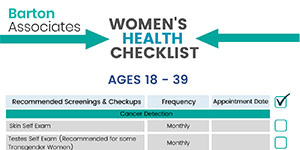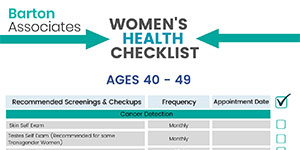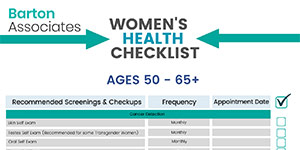Complete Women's Health Checklist for Women Aged 18-39
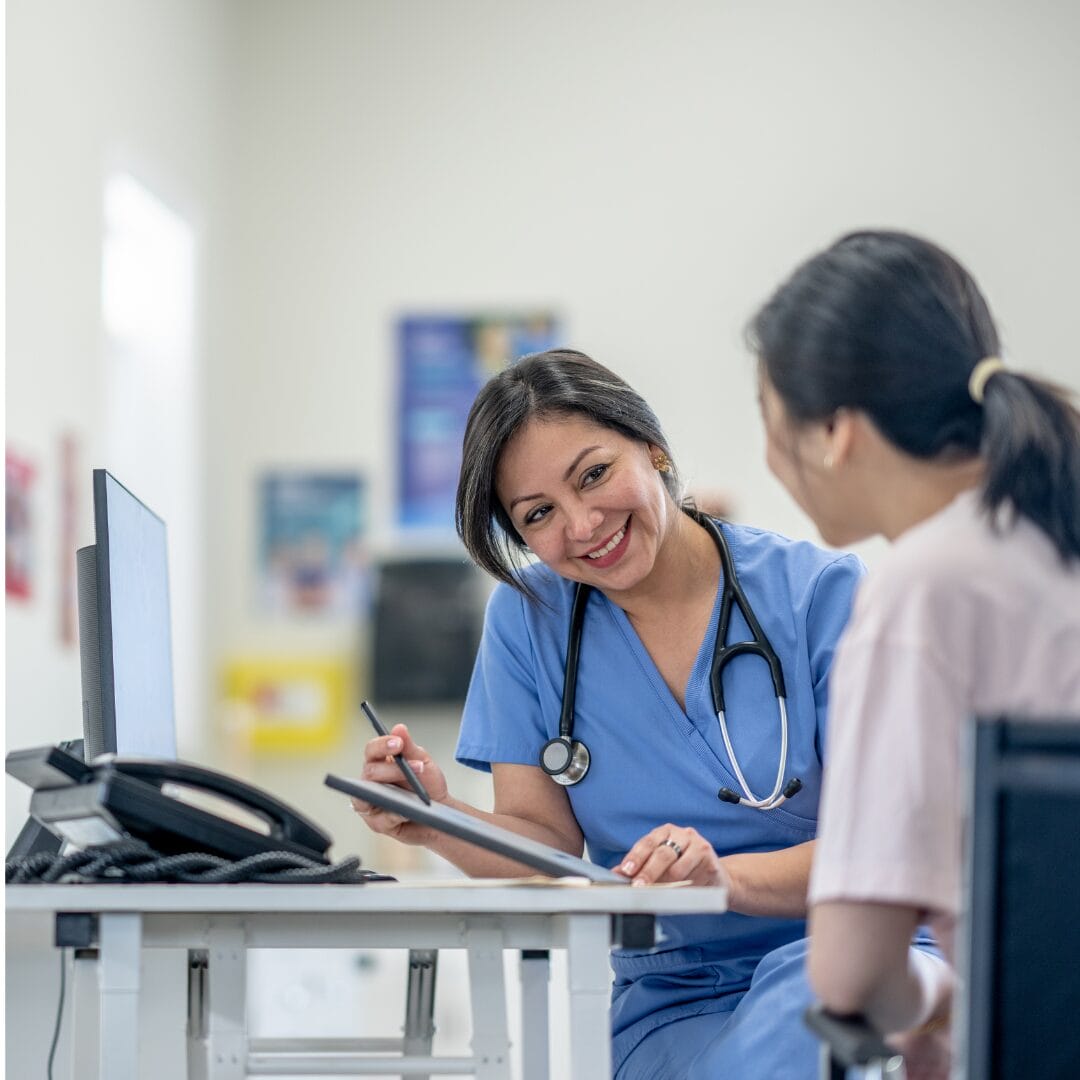
GETTING AHEAD OF WOMEN’S HEALTH ISSUES BEFORE THEY APPEAR
Like all children, young girls only have to worry about seeing their primary care physician annually. Until, suddenly, teenage girls have to start seeing other specialists as early as 12 or 13 years old. Specialists can range from an OB/GYN for reproductive health, or a dermatologist for acne. Women generally start attending specialized appointments outside their regular family practice fairly young.
Because of this, many women aren’t surprised to find that their list of additional exams and screenings grows longer as they grow older. The annual physical exam checklist for women is comprehensive and necessary.
Our Complete Women’s Health Checklist for women aged 18 to 39 compiles all the tests, screenings, exams, and vaccines you need. We organize your appointments by breaking them up into easy-to-understand categories by purpose and frequency.
Download Your Complete Women’s Health Checklist for Ages 18-39
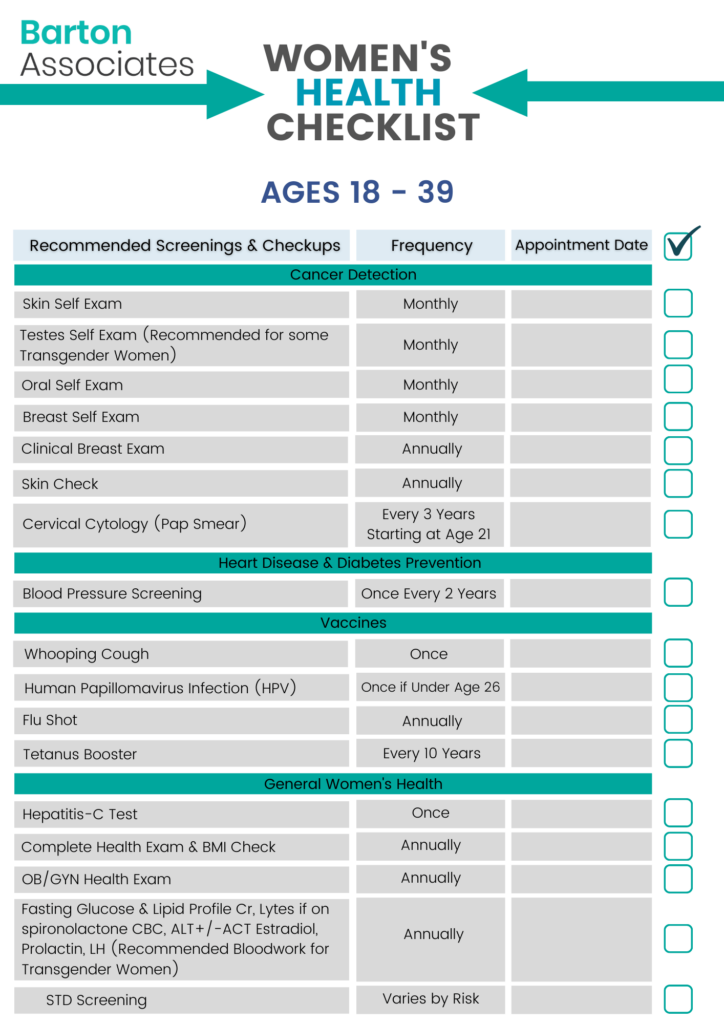
When calling your doctor to schedule checkups and tests, it’s helpful to know what you’ve just scheduled, and why it’s important! Read on to see the recommended screenings, checkups, and vaccines in our Women’s Health Checklist for Women Aged 18-39.
Complete Health Exam
- An assessment of overall health utilizing tests often ordered during your annual wellness visit. Mainly to evaluate health concerns common among men. Your doctor may also go over your family’s health history.
Clinical Breast Exam
- A physical examination of the breasts performed by a physician. Checking for any lumps or changes to detect breast cancer.
Skin Check
- A head to toe skin examination and discussion of your concerns and medical history with a physician. Done either as a part of your routine annual check up, or with a dermatologist.
BMI Check
- A calculation of a person’s body fat percentage using height and weight. Used to screen for risk factors that may lead to health problems.
Cervical Cytology
- Also called a Pap test or Pap smear. A cervical cytology is the study of cells taken from the cervix using a microscope. Screens for cervical cancer by detecting changes in the cells of the cervix.
Blood Pressure Screening
- A measurement of the pressure in your arteries as your heart pumps. Done using an arm cuff inflated with air, and using a stethoscope to listen to your blood flow.
Human Papillomavirus Infection (HPV) Vaccine
- A vaccination that prevents cancer-causing infections and precancers.
Whooping Cough Vaccine
- A vaccination that prevents against whooping cough, diphtheria, and tetanus.
Flu Shot
- An annual vaccination that prevents the influenza virus.
Tetanus Booster
- A vaccination that prevents against tetanus, an infection caused by Clostridium tetani bacteria.
Hepatitis-C Test
- The HCV antibody test, a blood test, sees if you have ever been infected with the Hepatitis-C virus.
OB/GYN Health Exam
- An assessment with your OB/GYN healthcare provider. Includes a pelvic exam, a Pap smear, a breast exam, and an assessment of your overall health status.
Fasting glucose and lipid profile CBC, ALT/-AST, Free and Total Testosterone
- Recommended for transgender women.
- Fasting glucose and lipid profile: A blood test including measurements for cholesterol and your fasting blood sugar level.
- ALT/-AST: A blood test which measures different types of liver enzymes to detect liver damage.
- Free and total testosterone: A blood test that measures the levels of free testosterone and total testosterone in your blood. Used to diagnose various conditions. Free testosterone is unattached to a protein. Total testosterone includes both free testosterone and testosterone attached to a protein.
STD Screening
- A blood test to find out if you have been infected with a sexually transmitted disease. Whether or not your doctor orders STD screening can depend on how sexually active you are.
Each of these tests and exams are crucial for preventative health. To help you with your women’s wellness exam checklist, here are some self exams:
Oral Self Exam Guidelines
Skin Self Exam Guidelines
Breast Self Exam Guidelines
Women’s Health Checklist for Ages 40+
Below are our annual physical exam checklists by age. For elderly women, check our our annual physical exam checklist for women over 50. These women’s health check-up list will also include more details on heart disease and diabetes prevention.
This article was originally written by the Barton Team in July 2022. It was updated by Desirae Sin in May 2024 to reflect current information.
